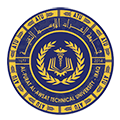Head of the Division: Ali Naima
Organizational Structure of the Quality Assurance and Performance Evaluation Division:
The division is administratively linked to the Dean of the Karbala Technical Institute, according to the institute’s organizational structure. The division consists of four administrative units:
1. Quality Assurance Unit
2. Performance Evaluation Unit
3. Training and Technical Support Unit
4. Laboratory Accreditation Unit
Vision, Mission, and Goals of the Quality Assurance and Performance Evaluation Division:
Since its establishment, the Quality Assurance and Performance Evaluation Division has aimed to achieve the best results by utilizing the capabilities and resources of the educational institution (the institute) and with the participation of all its staff. This is done to meet the needs of society and the requirements of the labor market, in accordance with national and international standards.
Vision of the Division:
To position the Karbala Technical Institute as a distinguished center in the field of quality and academic and institutional accreditation.
Mission of the Division:
The mission of the Quality Assurance and Performance Evaluation Division is to enhance and improve the academic and institutional performance of the Karbala Technical Institute by applying the latest and best practices in quality assurance and performance evaluation. These practices are centered around efficiency and competitive capabilities to elevate the institute’s output and meet the requirements for national and international accreditation. As a division dedicated to quality assurance, we believe that quality is an integrated work system reflecting the maturity of senior management in striving for improved quality.
Goals of the Division:
1. Building an Integrated Quality Assurance System: Develop a comprehensive quality assurance system based on national and international standards, and ensure its implementation to support the vision, mission, and goals of the division. This includes providing technical support in the field of quality assurance and academic accreditation to all departments, divisions, and units of the institute.
2. Developing a Creative Work Environment: Foster an innovative work environment at the institute that keeps pace with increasing knowledge developments, aiming for leadership in quality and academic accreditation. This will be achieved through conferences, seminars, meetings, and workshops in the field of quality and academic accreditation.
3. Ensuring Continuous Improvement: Guarantee continuous improvement in the process of monitoring and evaluating the performance of the institute’s departments, divisions, and units by building an integrated annual self-evaluation system and tracking the implementation of continuous improvement plans across the institute.
4. Monitoring Performance of Staff Members: Evaluate the performance of the institute’s staff and set clear standards to improve performance in line with the requirements of university services. This includes encouraging healthy competition among the institute’s departments to enhance the educational process and its outcomes.
5. Promoting a Quality Culture: Continue to spread awareness and a culture of quality across the institute’s departments to ensure a competitive edge in terms of quality assurance and its applications.
Quality Assurance and Performance Evaluation Tasks :
1. Preparing and monitoring the implementation of the strategic plan for the Quality Assurance Division to strengthen the quality of the educational outcomes of the institute.
2. Organizing workshops and seminars to promote the culture of quality among faculty members, students, and all staff at the institute, and raising awareness about the importance of applying quality systems and academic accreditation standards.
3. Preparing studies that reflect the current status of the institute and developing an improvement plan according to national and international standards.
4. Providing support and advice to the institute’s departments regarding all matters related to quality and academic accreditation.
5. Monitoring the implementation of international academic accreditation standards according to the specializations of colleges and centers in order to obtain specialized accreditation certificates from reputable global institutions.
6. Conducting regular monitoring and oversight to ensure the implementation of quality assurance and accreditation standards within the institute.
7. Following up on the preparation of self-evaluation reports and improvement plans for the departments.
8. Preparing the annual final report on the achievements of the institute’s departments, divisions, and units.
9. Preparing periodic survey forms for the key components of the educational process, which include: student feedback forms to evaluate the educational process, faculty feedback surveys, and periodic reports.

